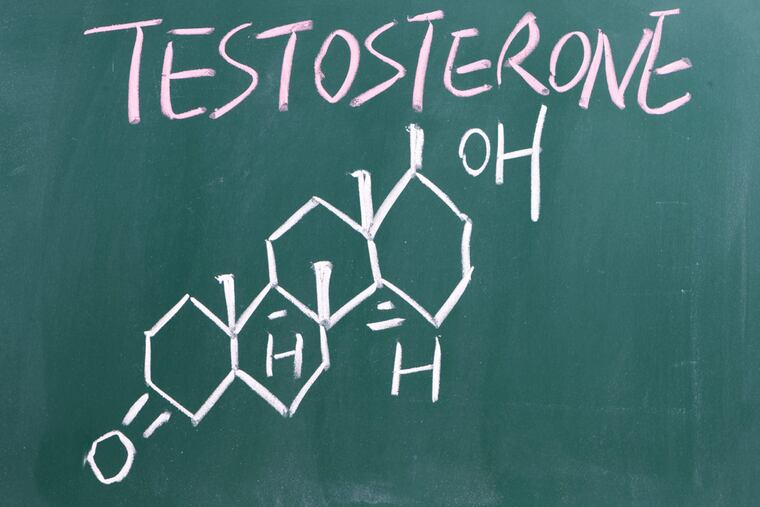Testosterone therapy gets mixed report in study
A long-awaited, government-funded study designed to test claims that testosterone can fix low libido, low mood, and low energy in older men has found that the therapy sort of helps.

A long-awaited, government-funded study designed to test claims that testosterone can fix low libido, low mood, and low energy in older men has found that the therapy sort of helps.
The hormone was somewhat better than a placebo for improving sexual function and mood, but not fatigue or walking speed. The findings are in Thursday's New England Journal of Medicine.
Still to be reported by the "T Trials" are analyses of testosterone's effects on memory, anemia, bone density, and coronary plaque buildup.
The caveat is that this $50 million research milestone cannot draw conclusions about the downsides of therapy. Though it was the largest study ever to pit testosterone against placebo - for a year in 790 men over age 64 - it was too small and too brief to settle concerns about heart attack, stroke, and prostate cancer risks.
University of Pennsylvania endocrinologist Peter J. Snyder, leader of the T Trials, said the finding of some modest benefits "should have no immediate effect on prescribing practices."
Current prescribing practices are troubling, the U.S. Food and Drug Administration has concluded. Over the last year, the agency has tried to crack down on the overprescribing of testosterone gels and injections. The $2 billion "Low T" market is mostly made up of men ages 40 to 64, many of whom take the drug without getting tested for testosterone deficiency, the FDA found.
Last March, the FDA ordered drugmakers to clearly say on product labeling that testosterone supplements are approved only to treat low levels caused by disease or injury, not by normal aging. Makers were also required to add a warning that the drug may increase the risk of heart attacks and stroke.
The T Trials, begun in 2009 and conducted at 12 medical centers across the country, enrolled senior men with confirmed abnormally low testosterone levels, plus one or more age-related symptoms that the quintessential male hormone might improve. AbbVie Inc. donated both its Androgel and the placebo gel.
The design of the trials was complex. To track some symptoms, such as sexual function and mood, the men repeatedly answered questionnaires over the course of the year. The men were also given various exams and tests. For example, the physical function trial looked to see how many men could walk at least an additional 50 meters - a little more than half a football field - in six minutes.
The study's 33 researchers - almost half with financial ties to testosterone makers - concluded the drug had "small to moderate" benefits on mood, sexual desire, and erectile function. However, the erectile effect was less than reported with drugs like Viagra.
Thomas Perls, a Boston Medical Center geriatrician who has written editorials criticizing "disease-mongering" in testosterone advertising, pointed out that 63 percent of men in the T Trials were obese.
"Obesity is a much more important cause of low testosterone than aging," Perls said. "The treatment they required was a weight-loss program."
Jesse Mills, a University of California, Los Angeles, urologist specializing in male reproductive medicine, who has consulted for testosterone manufacturers, called the study a "landmark" that "sets the stage for a better discussion of what testosterone does and doesn't do."
He said he believes treating obesity and low testosterone are not mutually exclusive.
"Why one or the other? Why not do both? Diet, exercise, and testosterone," he said.
Michael Carome, director of health research for the consumer advocacy group Public Citizen, said both advocates and critics of Low T therapy will "find what they want" in the new paper.
"Those doctors who advocate for use of testosterone will obviously trumpet these results," he said. "For those of us who have raised concerns about the safety . . . this doesn't give us any further information to help assess the risks."
In 2002, the National Institutes of Health considered underwriting a study big enough to weigh testosterone's risk-benefit balance. The NIH had funded the Women's Health Initiative, the mammoth $725 million trial that shattered conventional wisdom in 2002 by showing that menopausal hormone replacement therapy does more harm than good.
Government advisers were worried that the advent of rub-on testosterone gels (testosterone is hard to absorb from pills) was leading aging men to embrace the same kind of sex-hormone use that backfired on women.
But unlike estrogen, testosterone's research record was so scant that evidence of benefits was lacking. Ultimately, the NIH decided it would be premature to try to tease out the risks until the benefits - if any - were clearer.
"The significance of this paper," Snyder said, "is that for the first time, we do know something about the possible benefits."
As for risks, last March the FDA ordered drugmakers to conduct a "well-designed" clinical trial to address the question of cardiovascular risks. The trial has not yet started.
mmccullough@phillynews.com215-854-2720@repopter